人教版丨九年级下册英语第14单元知识点总结
人教版九年级全一册英语第十四单元知识点整理

九年级英语第十四单元知识点梳理Unit 14 I remember meeting all of you in Grade 7. 短语整理•in a row 连续几次地•look back at 回首(往事);回忆;回顾•make a mess 弄得一团糟(一塌糊涂)•keep one’s cool 沉住气;保持冷静•senior high (school) 高中•junior high (school) 初中•go by(时间)逝去;过去•believe in 信任;信赖•first of all 首先•be thirsty for 渴望;渴求•be thankful to sb. 对某人心存感激•ahead of 在……前面•along with 连同;除……以外还•be responsible for 对……有责任•set out 出发;启程•separate from 分离;隔开•win a prize 获奖•do a school survey 做一个学校调查•meet the standards of … 满足……的要求/标准• a group of 一群•score two goals 踢进两个球•learn to do sth 学着去做某事•take a break 休息一下•be patient with sb 对……有耐心•work out 解出(答案);想出(解决方法)•take the time to do sth 花时间去做某事•put in more effort 更加努力•be on time 按时,准时•look forward to 期待……•have problems with … 在……方面有问题•get a … degree 取得一个……学位•be full of … 充满……的•in some way 在某种程度用法讲解•in a row 连续几次地o e.g., This is my third win in a row. 这是我连续获得的第三次胜利。
人教版九年级全册英语第14单元知识点复习提纲
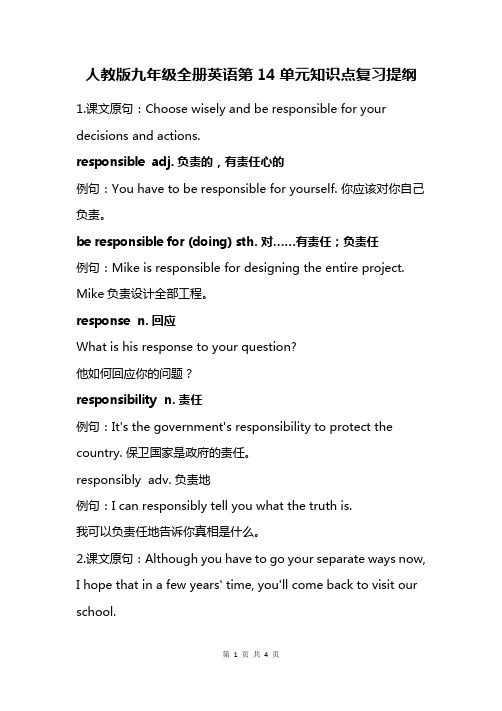
人教版九年级全册英语第14单元知识点复习提纲1.课文原句:Choose wisely and be responsible for your decisions and actions.
responsible adj. 负责的,有责任心的
例句:You have to be responsible for yourself. 你应该对你自己负责。
be responsible for (doing) sth. 对……有责任;负责任
例句:Mike is responsible for designing the entire project. Mike负责设计全部工程。
response n. 回应
What is his response to your question?
他如何回应你的问题?
responsibility n. 责任
例句:It's the government's responsibility to protect the country. 保卫国家是政府的责任。
responsibly adv. 负责地
例句:I can responsibly tell you what the truth is.
我可以负责任地告诉你真相是什么。
2.课文原句:Although you have to go your separate ways now,
I hope that in a few years' time, you'll come back to visit our school.
第1页共4页。
(完整版)人教版九年级英语第十四单元知识点总结
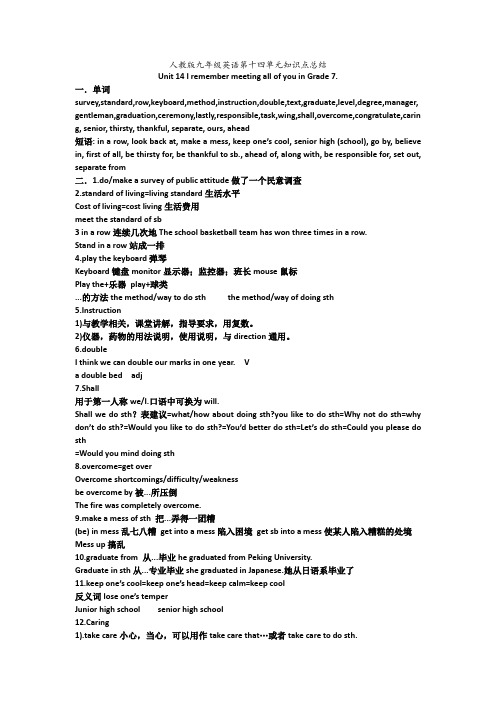
人教版九年级英语第十四单元知识点总结Unit 14 I remember meeting all of you in Grade 7.一.单词survey,standard,row,keyboard,method,instruction,double,text,graduate,level,degree,manager, gentleman,graduation,ceremony,lastly,responsible,task,wing,shall,overcome,congratulate,carin g, senior, thirsty, thankful, separate, ours, ahead短语: in a row, look back at, make a mess, keep one’s cool, senior high (school), go by, believe in, first of all, be thirsty for, be thankful to sb., ahead of, along with, be responsible for, set out, separate from二.1.do/make a survey of public attitude做了一个民意调查2.standard of living=living standard生活水平Cost of living=cost living生活费用meet the standard of sb3 in a row连续几次地The school basketball team has won three times in a row.Stand in a row站成一排4.play the keyboard弹琴Keyboard键盘monitor显示器;监控器;班长mouse鼠标Play the+乐器play+球类...的方法the method/way to do sth the method/way of doing sth5.Instruction1)与教学相关,课堂讲解,指导要求,用复数。
人教版英语九年级unit 14知识点

人教版英语九年级unit 14知识点Unit 14 Knowledge PointsIn this unit, we will explore various knowledge points covered in the ninth grade English textbook published by People's Education Press (人教版). Here, we will delve into the key concepts and ideas introduced in Unit 14. It is important to note that the format of this article will not strictly follow the textbook's layout, but it aims to effectively communicate the knowledge points in a clear and organized manner.1. Understanding CultureUnit 14 of the ninth-grade English textbook focuses on the theme of "Culture." It aims to broaden students' understanding of different cultures and promote intercultural communication. The unit covers topics such as traditional festivals, cultural exchanges, and customs from around the world.2. Vocabulary and GrammarUnit 14 also introduces new vocabulary words and grammar structures to enhance students' language proficiency. Some of the key vocabulary words include "custom," "tradition," "symbol," and "belief." These words are essential for students to comprehend the cultural concepts discussed in the unit.In terms of grammar, students will learn about the passive voice, comparatives and superlatives, and reported speech. Understanding these grammar points is crucial for students to express their ideas accurately and effectively.3. Reading ComprehensionUnit 14 provides several reading passages that aim to improve students' reading comprehension skills. These passages are designed to expose students to a variety of cultural topics, such as Chinese New Year, Thanksgiving, and the Olympic Games.Through reading and analyzing these texts, students can gain a deeper understanding of different cultures and traditions. Additionally, comprehension exercises are provided to test students' understanding of the passages and reinforce their reading skills.4. Listening and SpeakingUnit 14 places great emphasis on listening and speaking skills. Listening exercises are included to help students develop their ability to understand spoken English in various contexts. These exercises feature dialogues, interviews, and speeches related to cultural topics.To enhance speaking skills, students engage in communicative activities where they discuss their own cultures, share experiences, and give presentations on different customs. This allows students to practice expressing themselves and communicating their ideas fluently in English.5. Writing PracticeUnit 14 also provides opportunities for students to improve their writing skills by focusing on descriptive and informative texts. Students are guided to write about a cultural festival, compare traditions, or share their cultural experiences.Writing tasks in this unit promote creativity, critical thinking, and language development. By engaging in these activities, students canreinforce their writing abilities and deepen their understanding of cultural diversity.ConclusionUnit 14 of the ninth-grade English textbook published by People's Education Press offers a comprehensive exploration of various knowledge points related to culture. Through vocabulary and grammar exercises, reading comprehension activities, listening and speaking tasks, and writing practice, students can broaden their horizons and enhance their language skills.This unit serves as a platform for students to appreciate the richness of different cultures and embrace diversity. By engaging with the content in Unit 14, students can develop a global perspective and become competent communicators in the English language.。
人教版英语九年级全册单元unit14知识点+测试卷+思维导图
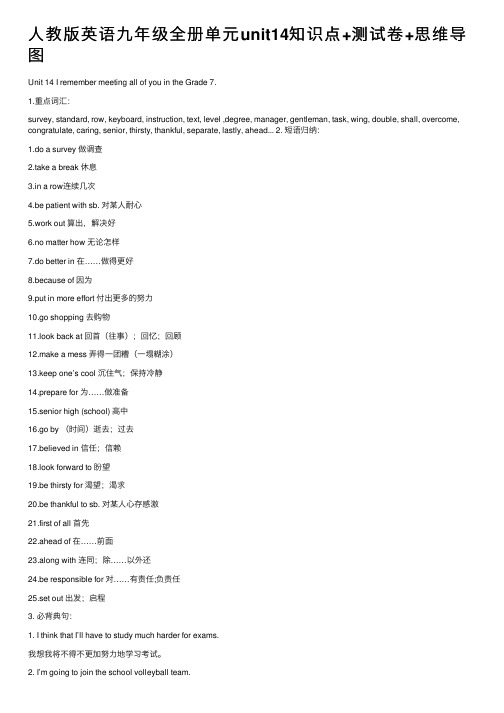
⼈教版英语九年级全册单元unit14知识点+测试卷+思维导图Unit 14 I remember meeting all of you in the Grade 7.1.重点词汇:survey, standard, row, keyboard, instruction, text, level ,degree, manager, gentleman, task, wing, double, shall, overcome, congratulate, caring, senior, thirsty, thankful, separate, lastly, ahead... 2. 短语归纳:1.do a survey 做调查2.take a break 休息3.in a row连续⼏次4.be patient with sb. 对某⼈耐⼼5.work out 算出,解决好6.no matter how ⽆论怎样7.do better in 在……做得更好8.because of 因为9.put in more effort 付出更多的努⼒10.go shopping 去购物11.look back at 回⾸(往事);回忆;回顾12.make a mess 弄得⼀团糟(⼀塌糊涂)13.keep one’s cool 沉住⽓;保持冷静14.prepare for 为……做准备15.senior high (school) ⾼中16.go by (时间)逝去;过去17.believed in 信任;信赖18.look forward to 盼望19.be thirsty for 渴望;渴求20.be thankful to sb. 对某⼈⼼存感激21.first of all ⾸先22.ahead of 在……前⾯23.along with 连同;除……以外还24.be responsible for 对……有责任;负责任25.set out 出发;启程3. 必背典句:1. I think that I’ll have to study much harder for exams.我想我将不得不更加努⼒地学习考试。
人教英语九年级下册知识点总结精讲Unit 14
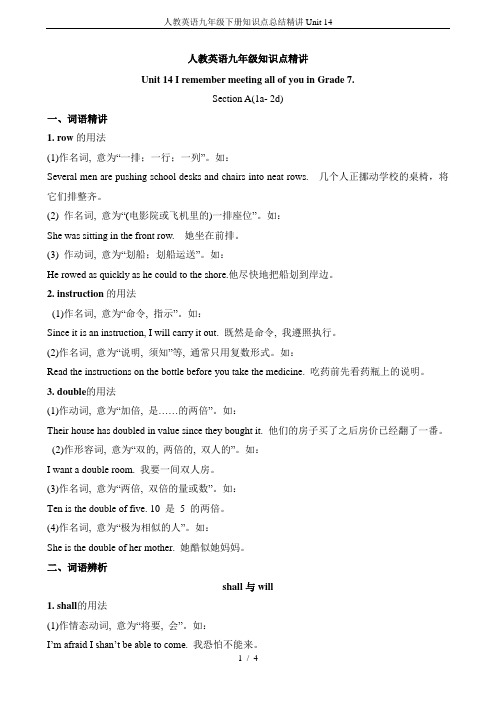
人教英语九年级知识点精讲Unit 14 I remember meeting all of you in Grade 7.Section A(1a- 2d)一、词语精讲1. row的用法(1)作名词, 意为“一排;一行;一列”。
如:Several men are pushing school desks and chairs into neat rows. 几个人正挪动学校的桌椅,将它们排整齐。
(2) 作名词, 意为“(电影院或飞机里的)一排座位”。
如:She was sitting in the front row. 她坐在前排。
(3) 作动词, 意为“划船;划船运送”。
如:He rowed as quickly as he could to the shore.他尽快地把船划到岸边。
2. instruction的用法(1)作名词, 意为“命令, 指示”。
如:Since it is an instruction, I will carry it out. 既然是命令, 我遵照执行。
(2)作名词, 意为“说明, 须知”等, 通常只用复数形式。
如:Read the instructions on the bottle before you take the medicine. 吃药前先看药瓶上的说明。
3. double的用法(1)作动词, 意为“加倍, 是……的两倍”。
如:Their house has doubled in value since they bought it. 他们的房子买了之后房价已经翻了一番。
(2)作形容词, 意为“双的, 两倍的, 双人的”。
如:I want a double room. 我要一间双人房。
(3)作名词, 意为“两倍, 双倍的量或数”。
如:Ten is the double of five. 10 是5 的两倍。
(4)作名词, 意为“极为相似的人”。
如:She is the double of her mother. 她酷似她妈妈。
人教版九年级初三英语第十四单元Unit14知识点+测试练习

⼈教版九年级初三英语第⼗四单元Unit14知识点+测试练习Unit14 I remember meeting all of you in Grade7. ⼀、短语回顾:⼆、考点解读:1.do / make a survey of public attitude _________________________2. living standard ________________________living cost ________________________meet the standard of sb. ________________________3. _______________ 说明书;使⽤说明①与教学相关,课堂讲解,指导要求,⽤复数。
②仪器,药物的⽤法说明,使⽤说明,与direction通⽤。
4. double①I think we can double our marks in one year. 【v. _____________】②a double bed 【adj. _____________________________】5. shall【⽤法】①⽤于第⼀⼈称_____ /_____。
②⼝语中可转换为_____。
【句型】Shall we do sth?(表建议)(⽤do / to do / doing填空。
)=What / How about _____ sth.?=Why not _____ sth. / Why don’t _____ sth?=Would you like _____ sth? = You’d better _____ sth.=Let’s _____ sth. = Would you mind _____ sth.?6.overcome=get over _____;_________________________ 克服弱点____________________ 战胜困难7. make a mess of sth ____________________( be ) in mess___________ get into a mess___________get sb into a mess____________________ mess up_____8. graduate from________________ He graduated from Peking University.9. go 短语:go by ___________;___________ as time goes by, ..._____________________ go ahead ___________;________;_____ go off ___________go on______;______ What’s going on here?go up______go down______go over______10. manage to do sth. = succeed in doing sth.____________________15.degree 学位;程度;度数To do this job, you must have a degree in English.从事这个⼯作你必须有英语专业的⼤学学位。
人教版九年级英语Unit14单元知识点总结
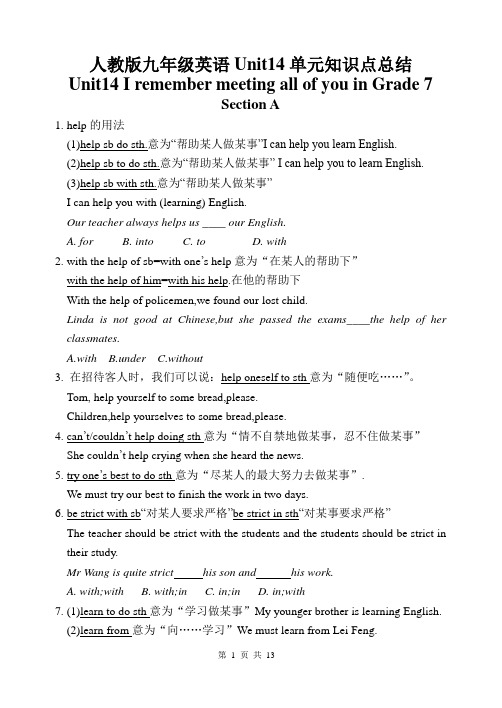
人教版九年级英语Unit14单元知识点总结Unit14 I remember meeting all of you in Grade 7Section A1. help的用法(1)help sb do sth.意为“帮助某人做某事”I can help you learn English.(2)help sb to do sth.意为“帮助某人做某事” I can help you to learn English.(3)help sb with sth.意为“帮助某人做某事”I can help you with (learning) English.Our teacher always helps us ____ our English.A. forB. intoC. toD. with2. with the help of sb=with one’s help意为“在某人的帮助下”with the help of him=with his help.在他的帮助下With the help of policemen,we found our lost child.Linda is not good at Chinese,but she passed the exams____the help of her classmates.A.withB.underC.without3. 在招待客人时,我们可以说:help oneself to sth意为“随便吃……”。
Tom, help yourself to some bread,please.Children,help yourselves to some bread,please.4. can’t/couldn’t help doing sth意为“情不自禁地做某事,忍不住做某事”She couldn’t help crying when she heard the news.5. try one’s best to do sth意为“尽某人的最大努力去做某事”.We must try our best to finish the work in two days.6. be strict with sb“对某人要求严格”be strict in sth“对某事要求严格”The teacher should be strict with the students and the students should be strict in their study.Mr Wang is quite strict his son and his work.A. with;withB. with;inC. in;inD. in;with7. (1)learn to do sth意为“学习做某事”My younger brother is learning English.(2)learn from意为“向……学习”We must learn from Lei Feng.(3)learn by oneself意为“自学”He learns French by himself.(4)learn about意为“了解,知道”The more you learn about the Chinese history,the more you enjoy living in China.8. 乐器前必须加定冠词the,球类运动前不加任何冠词。
- 1、下载文档前请自行甄别文档内容的完整性,平台不提供额外的编辑、内容补充、找答案等附加服务。
- 2、"仅部分预览"的文档,不可在线预览部分如存在完整性等问题,可反馈申请退款(可完整预览的文档不适用该条件!)。
- 3、如文档侵犯您的权益,请联系客服反馈,我们会尽快为您处理(人工客服工作时间:9:00-18:30)。
人教版丨九年级下册英语第14单元知识点总结
Unit14 I remember meeting all of you in Grade 7.
【重点短语】
1. win a prize 获奖
2. do a school survey 做一个学校调查
3. meet the standard of a strict teacher 满足一位要求严格的老师的要求
4. meet this group of friends 遇到这群朋友
5. score two goals in a row 连续踢进两个球
6. learn to play the keyboard 学会弹钢琴
7. be patient with sb 对……有耐心
8. work out the answer yourself 自己找出答案
9. guide sb to do sth 指导某人做某事
10. put in more effort 更加努力
11. look back at 回首
12. pride of overcoming fear 克服恐惧感的自豪
13. make a great big mess 弄得一团糟
14. keep my cool 保持我的清高
15. try to be on time for morning reading 尽力赶上早读
16. look forward to doing sth 期望做某事
17. join the school swim team 加入学校游泳队
18. get a business degree 取得一个商业学位
【重点句型】
1. ---What happened in Grade7 that was special?
在七年级时发什么了什么特别的事?
---Our team won the school basketball competition.
我们队赢了学校的蓝球比赛。
3. ---How have you changed since you started junior high school?你上中学后有什么变化?
---I've become much better at speaking English.
我在说英语上比以前更好。
3. How do you think things will be different in senior high school?你认为在高中会有什么不同?
---I think that I'll have to study much harder for exams.
我想我将更加为考试努力学习。
4. ---What are your plans for next year? 你明年的计划是什么?
---I'm going to join the school volleyball team. 我将加入学校排球队。
5. ---What do you remember about Grade 8. 关于八年级你记得什么?---I remember being a volunteer. 我记得当一名志愿者。
6. ---What do you use to do that you don't do now?
你以前做而现在不做的事是什么?
---I used to take dance lessons, but I don't anymore.
我以前上舞蹈课,但现在不上了。
7. ---What are you looking forward to? 你期望做什么?
---I'm looking forward to going to senior high school. 我期望上高中。
【考点详解】
1. She helped you to work out the answers yourself no matter how difficult they were. 她帮助你自己算出答案,无论它们有多难。
no matter常与疑问代词或疑问副词一起构成连词词组引导让步状语从句,意为“不管……,无论……”,在运用时应注意以下几点:
(1)注意从句的时态
由no matter what/who/where/when引导的从句往往用一般现在时或一般过去时。
如:No matter who you are, you must obey the rules. 无论你是谁,都应该遵守规则。
(2)注意被修饰的名词、形容词以及副词的位置
no matter what/whose/which修饰名词时,该名词必须紧跟其后;no matter how修饰形容词或副词时,该形容词或副词也必须紧跟其后。
如:No matter how hard he works, he find it difficult to make ends meet. 无论他多么努力工作,却总是入不敷出。
(3)注意“no matter+疑问词”结构与“疑问词+ever”在用法上的区别:
①“no matter+疑问词”结构只能引导让步状语从句,这时可以和“疑问词+ever”互换。
如:No matter where he may be (=Wherever he may be),he will be happy. 他无论在什么地方都快乐。
②而“疑问词+ever”还可以引导名词性从句。
如:Give this book to whoever likes it. 谁喜欢这本书就给谁吧。
(这里不能用no matter who)
③whoever既可引导名词性从句,又有在从句中作主语、宾语、表语等;whomever也可引导名词性从句,但只能在从句中作宾语。
如:You may invite whomever you like.
2. caring adj. 体贴人的
如:I will miss the school trees and flowers and our kind and caring teachers. 我会怀念学校的树木花草以及我们善良,体贴的老师。
3. 用于go ahead, 注意以下用法:
(1)表示同意或允许,意为“说吧”、“做吧”
A:May I start? 我可以开始了吗?
B:Yes, go ahead. 好,开始吧。
(2)表示继续做某事,意为“继续…吧”
Go ahead. We are all listening. 继续讲吧,我们都在听呢!
4. As you set out on your new journey, you shouldn't forget where you came from. 当你出发踏上你的新的旅程时,不要望了你来自哪里。
set out 意为“出发;开始;陈述”。
例句:The professor sets out his ideas clearly in his article. 在这篇文章中教授清楚地表明了自己的想法。
set的用法:
(1)set about sth./doing sth. 着手做某事
如:We set about our task at once with great enthusiasm. 我们以极大的热情立即着手这项任务。
(2)set aside 放在一边,搁置;存蓄,留下
如:My parents set aside a bit of money every month. 我的父母每个月都存点钱。
(3)set off 动身,出发;燃放(鞭炮等),使……爆炸或发出响声
如:After we had finished eating, he proposed to set off immediately. 我们吃完饭后,他建议立即动身。
(4)set out 动身,出发;set out to do sth. 打算或着手做某事。
如:They set out as the sun was rising. 太阳升起时,他们就出发了。
(5)set up 竖起来,支起来;建立,成立。
如:The school has set up a special class to help slow students.
学校成立了一个特殊的班级,帮助那些后进生。
